
Jacques Offenbach was a German-born French composer, cellist and impresario. He is remembered for his nearly 100 operettas of the 1850s to the 1870s, and his uncompleted opera The Tales of Hoffmann. He was a powerful influence on later composers of the operetta genre, particularly Franz von Suppé, Johann Strauss II and Arthur Sullivan. His best-known works were continually revived during the 20th century, and many of his operettas continue to be staged in the 21st. The Tales of Hoffmann remains part of the standard opera repertory.
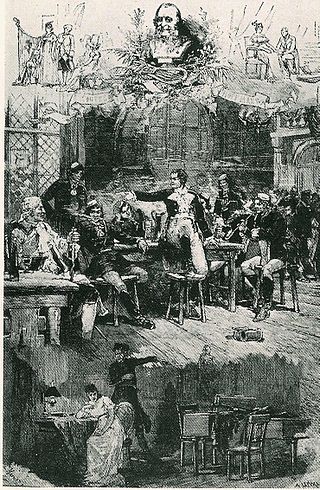
The Tales of Hoffmann is an opéra fantastique by Jacques Offenbach. The French libretto was written by Jules Barbier, based on three short stories by E. T. A. Hoffmann, who is the protagonist of the story. It was Offenbach's final work; he died in October 1880, four months before the premiere.

Henri Meilhac was a French dramatist and opera librettist, best known for his collaborations with Ludovic Halévy on Georges Bizet's Carmen and on the works of Jacques Offenbach, as well as Jules Massenet's Manon.

Comic opera, sometimes known as light opera, is a sung dramatic work of a light or comic nature, usually with a happy ending and often including spoken dialogue.

Ernest Guiraud was an American-born French composer and music teacher. He is best known for writing the traditional orchestral recitatives used for Bizet's opera Carmen and for Offenbach's opera Les contes d'Hoffmann.

L'île de Tulipatan is an opéra bouffe, in one act by Jacques Offenbach to an original French libretto by Henri Chivot and Alfred Duru.
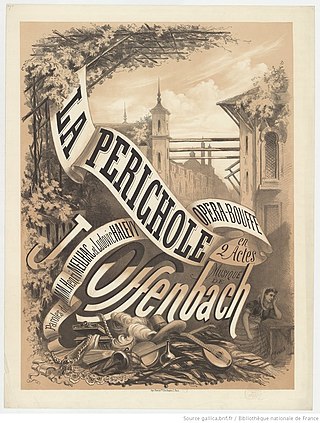
La Périchole is an opéra bouffe in three acts with music by Jacques Offenbach and words by Henri Meilhac and Ludovic Halévy. The opera depicts the mutual love of two impoverished Peruvian street singers – too poor to afford a marriage licence – and a lecherous viceroy, Don Andrès de Ribeira, who wishes to make La Périchole his mistress. Love eventually triumphs. The story is based loosely on the play Le carrosse du Saint-Sacrement by Prosper Mérimée (1828), and the title character is based on the Peruvian entertainer Micaela Villegas.

Madame Favart is an opéra comique, or operetta, in three acts by Jacques Offenbach. The French libretto was written by Alfred Duru and Henri Chivot.

La fille du tambour-major is an opéra comique in three acts, with music by Jacques Offenbach and words by Alfred Duru and Henri Chivot. It was one of the composer's last works, premiered less than a year before his death. It opened at the Théâtre des Folies-Dramatiques, Paris, on 13 December 1879, and, after a successful initial run, was frequently revived in Paris and internationally, but in recent times has not been among the Offenbach operas most frequently staged.
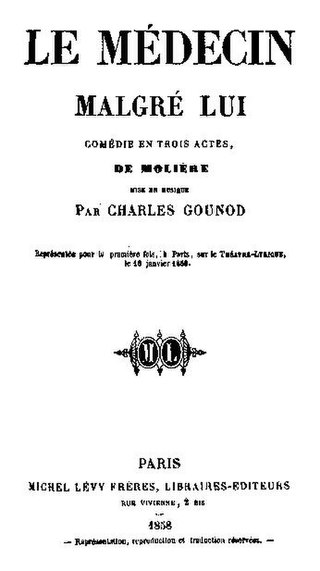
Le médecin malgré lui is an opéra comique in three acts by Charles Gounod to a libretto by Jules Barbier and Michel Carré after Molière's play of the same name. The work premiered at the Théâtre Lyrique in Paris on 15 January 1858.

Zulma Madeleine Boufflar, known as Zulma Bouffar,, was a French soprano singer and actress, associated with the opéra-bouffe of Paris in the second half of the 19th century who enjoyed a successful career around Europe.

Le violoneux is a one-act operetta by Jacques Offenbach to a French libretto by Eugène Mestépès and Émile Chevalet, first performed in 1855.

Les pêcheurs de perles is an opera in three acts by the French composer Georges Bizet, to a libretto by Eugène Cormon and Michel Carré. It was premiered on 30 September 1863 at the Théâtre Lyrique in Paris, and was given 18 performances in its initial run. Set in ancient times on the island of Ceylon, the opera tells the story of how two men's vow of eternal friendship is threatened by their love for the same woman, whose own dilemma is the conflict between secular love and her sacred oath as a priestess. The friendship duet "Au fond du temple saint", generally known as "The Pearl Fishers Duet", is one of the best-known in Western opera.
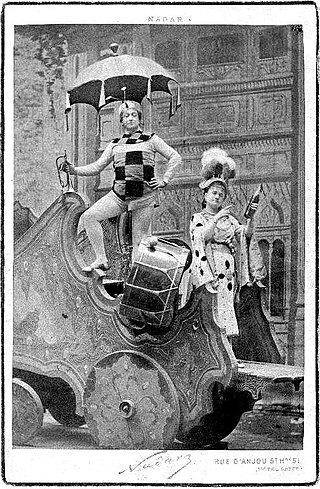
Christian Perrin, known by his stage-name Christian, was a French actor and singer in operetta, born in Paris, 1 January 1821, and died there in December 1889. He had a long and successful career in Paris from the 1850s up to his death.

Fantasio is an 1872 opéra comique in 3 acts, 4 tableaux, with music by Jacques Offenbach. The French libretto by Paul de Musset was closely based on the 1834 play of the same name by his brother Alfred de Musset. The opera found little success in Offenbach's lifetime, was occasionally revived until the preparation of a critical edition in the 2000s.

Tromb-al-ca-zar, ou Les criminels dramatiques is a bouffonnerie musicale in one act of 1856 with music by Jacques Offenbach. The French libretto was by Charles-Désiré Dupeuty and Ernest Bourget. With its dialogue containing plays on words and stage business from contemporary Parisian dramas and operas, it is described by Kracauer as satirizing the romantic bandits of grand opera.

Pierrette et Jacquot is a one-act opérette of 1876 by Jacques Offenbach with a French libretto by Jules Noriac and Philippe Gille.
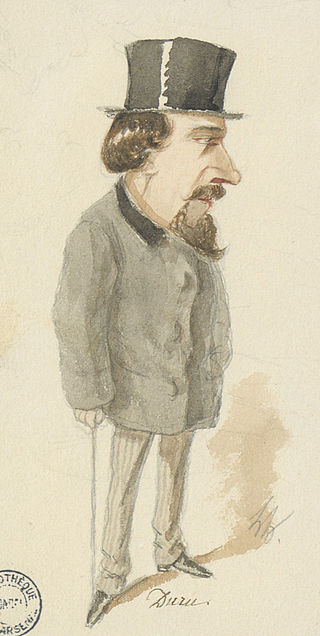
Henri Alfred Duru was a 19th-century French playwright and operetta librettist who collaborated on more than 40 librettos for the leading French composers of operetta: Hervé, Offenbach, Lecocq and Audran.
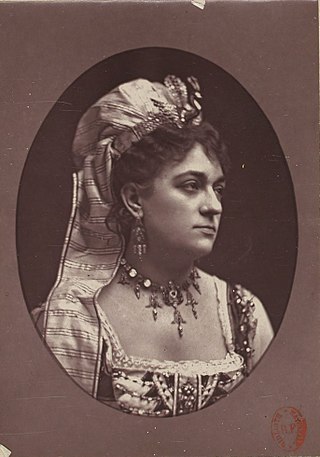
Anna Van Ghell was a Belgian singer who starred in numerous operettas in Paris. She was called Anna Vanghel or Vanghell in France.
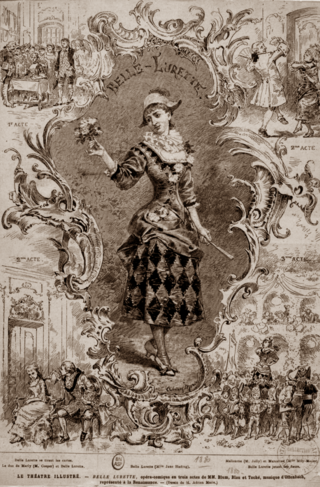
Belle Lurette is a three-act opéra comique with music by Jacques Offenbach and words by Ernest Blum, Edouard Blau and Raoul Toché. It was first performed at the Théâtre de la Renaissance, Paris, on 30 October 1880. The composer died before the orchestration of the score was finished, and Léo Delibes completed it.


















